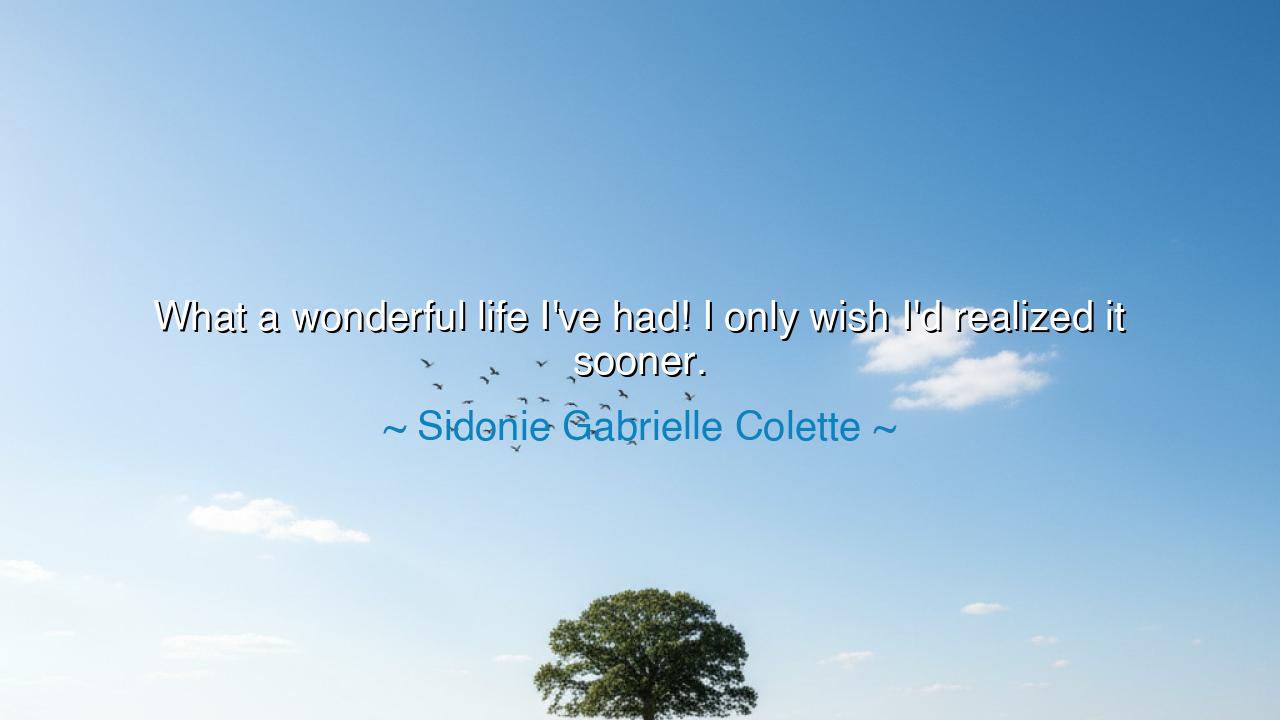
What a wonderful life I've had! I only wish I'd realized it






“What a wonderful life I’ve had! I only wish I’d realized it sooner.” Thus spoke Sidonie Gabrielle Colette, the French novelist, actress, and free spirit who lived through love, scandal, beauty, and sorrow—and who, in her later years, uttered these words as a confession and a revelation. In this brief but radiant sentence lies a truth as old as time and as urgent as the beating of the human heart: that life’s beauty is often invisible until it begins to fade, and that our greatest tragedy is not the pain we suffer, but the joy we fail to notice. Colette, whose life was a tapestry of passions and artistry, reminds us that to live well is not merely to survive, but to awaken—to see, while we still can, that the ordinary moments of our days are the very fabric of paradise.
To understand this quote, one must understand the woman behind it. Colette was born in 1873 in the French countryside and rose to fame in Paris during the Belle Époque—a time of elegance, art, and excess. She was a woman of rebellion, who wrote with boldness about the desires, dreams, and freedoms of women in a world that sought to cage them. She loved deeply, suffered publicly, and lived fearlessly. Yet, like so many who live passionately, she did not always recognize the wonder of her own journey until the twilight of her years. In those final reflections, she looked back and saw that her life—its loves, its heartbreaks, its mornings filled with writing and evenings filled with laughter—was not something to regret, but something to revere. Her lament was not of a life wasted, but of a life underappreciated while it unfolded.
The essence of her quote is a lesson in awareness—that happiness does not lie in the grand or the distant, but in the immediate, in the present moment that so often escapes our notice. Like Colette, many souls awaken too late, discovering only at life’s end that they were surrounded all along by miracles they took for granted: the warmth of sunlight, the smile of a friend, the quiet of a morning, the scent of bread baking, the laughter of a child. Life, she teaches us, is not something to be pursued—it is something already here, waiting to be recognized. Gratitude is the lens through which the wonderful becomes visible.
The ancients understood this truth. The philosopher Epicurus, often misunderstood as a lover of pleasure, taught that the secret to joy was not indulgence but appreciation—the art of finding contentment in simple things. “He who is not satisfied with little will not be satisfied with much,” he said. The same wisdom flows through Colette’s words. She does not mourn the lack of greatness in her life; she mourns her delay in seeing that greatness had always been there. She joins a chorus of voices across time—the poets, sages, and saints who remind us that to see clearly is the greatest enlightenment.
Consider the life of Vincent van Gogh, who, like Colette, found beauty in the common things—the fields of wheat, the night sky, a vase of sunflowers. Yet he lived in torment, unable to feel the joy that his art revealed to others. Only after his death did the world recognize the glory that had flowed through his brush, and had he lived to see it, perhaps he would have said as Colette did: “What a wonderful life I’ve had—I only wish I’d realized it sooner.” For the tragedy of the human spirit is that it often perceives beauty only in retrospect, seeing clearly only when the light begins to dim.
Colette’s words call us to awaken now, while breath still fills our lungs and the days are still ours to live. They ask us to stop waiting for some future perfection and to see the sacred in the present. It is not the length of life that matters, but the depth of our awareness. How often do we rush through our days, chasing what we lack, instead of savoring what we already hold? To live wisely, we must learn to pause, to breathe, to look, and to whisper, even in hardship, “This too is part of the wonder.” Life is not always kind, but even in its trials, there is something precious to behold—the resilience of the heart, the strength of the spirit, the miracle of simply being.
So, my child of fleeting years, take this truth into your heart: do not wait to realize how wonderful life is. Look around you—the world is filled with quiet marvels. Cherish them now, before memory turns them into longing. Tell those you love that you love them. Take time to feel the wind, to laugh freely, to forgive swiftly. The moments you waste in worry or resentment are moments lost to wonder. Let gratitude become your daily prayer, for it will open your eyes to the splendor that is already yours.
For this is Colette’s final gift to us—a reminder whispered across time, from one soul who finally saw clearly to all those still hurrying through the fog: “What a wonderful life I’ve had! I only wish I’d realized it sooner.” May you, unlike her, realize it now. May you see the miracle in the mundane, the grace in the struggle, and the light in every passing day. For the secret of happiness lies not in changing life, but in awakening to its wonder before it passes beyond reach.






AAdministratorAdministrator
Welcome, honored guests. Please leave a comment, we will respond soon